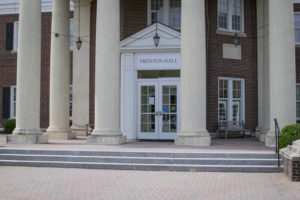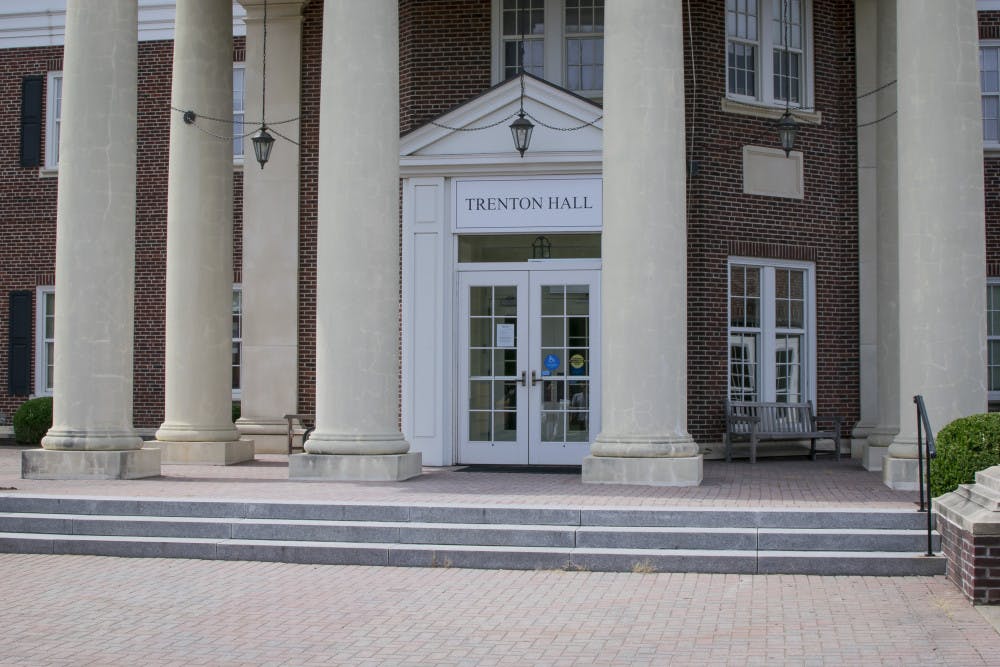By Elizabeth Zakaim
Arts & Entertainment Editor
Change is often unavoidable, usually natural, yet sometimes forced by hand. Society changes and grows with time, but often leaves footprints of its past buried so deep that people question whether it should be uprooted or left as a reminder for the future.
The College’s decision to rename Paul Loser Hall, now Trenton Hall, this past May has left some people satisfied and others disgruntled. Those who have attended the College have differing opinions on the issue.
Princeton councilman and Trenton State alumnus Timothy Quinn (’81), recalled Princeton University’s struggle in 2015, when the school considered removing former President Woodrow Wilson’s name from its buildings. Wilson, also the president of Princeton University from 1902 to 1910, was a segregationist, according to Princeton’s Board of Trustees committee. Despite student sit-ins and protests, Princeton University ultimately decided not to remove Wilson’s name in 2016, according to NPR.
Quinn, who graduated before Paul Loser Hall was built, was a strong supporter of the name change. He appreciated that the College was being transparent in acknowledging its history.
“It really spoke to me as a Trenton State alumnus that they were not whitewashing the history of the College and its beginnings in Trenton,” Quinn said.
The name change has left a sour taste in the mouths of some alumni, who believed that the change stripped the College of some of some credibility.
Alumna Gabrielle Okun (’17) believes that the College was adapting to the whims of today’s “political correctness.” According to Okun, history is not about sanitizing past wrongdoing, even if some people find it to be offensive.
“This action sets a dangerous precedent,” Okun said. “If we take down anything that is deemed offensive to a 21st century perspective at a school, regardless if it’s a statue of a historical figure or a name of a building that does not represent present-day values, we would simply have no history.”
While Okun was disappointed to learn that Paul Loser was a proponent of segregation, she acknowledged that it was a common belief for many at the time, as hard as that fact can be for people to swallow. She said that while the New Jersey Supreme Court ruling in 1944 made segregation of public schools illegal, it didn’t automatically change people’s personal views on racism.
“It was a common belief for the time, whether or not we want to admit that,” Okun said.

College President R. Barbara Gitenstein contested that notion in an Oct. 11 meeting with The Signal.
“If you look, as I’ve presented in my letter to the board, the issue with regard to changing the name had to do with the history of an individual who was a public employee who broke the law,” Gitenstein said.
Real estate broker T. Christopher Hill of Robbinsville, New Jersey, who attended the College from 1978 until 1982, took issue not with the name change, but with the naming of the building.
“I think the school didn’t do a good enough job vetting the person,” Hill said. “They should have done more research before they took the family’s money.”
The story of how Paul Loser Hall earned its name was best told by the president of the College at the time, Harold Eickhoff.
During the 1980s, Eickhoff and other administrators saw a strong need for a foundation independent of state and alumni donations, neither of which were satisfying the College’s financial needs. Pete Loser, at the time the executive vice president of a company now called Verizon, agreed to head this dynamic fundraising arm: The Trenton State College Foundation.
During the 1982-83 academic year, Pete Loser approached Eickhoff with a donation proposal. The donor, who wished to remain anonymous, wanted to make a gift to the College that would also serve as a memorial. Pete Loser and Eickhoff had grown very close, and the vagueness of the request puzzled the president, but he did not press for details. The original offer was for about $30,000 to $50,000, which was not quite enough for the investment.
During this time, Eickhoff and Pete Mills, the College’s business officer, were already working out the plans for what is now Trenton Hall.
“It was going to be a statement of our commitment to quality and we knew that would cost extra,” Eickhoff said.
Mills and Eickhoff agreed to memorialize the building in the donor’s name if it could be worked out.
Pete Loser soon revealed the donor –– his brother, Tom Loser, who was willing to donate $1 million to memorialize his father, Paul Loser. Tom Loser asked for complete privacy and anonymity at the time, and the deal was sealed verbally. According to Eickhoff, none of this transaction was put in writing.
“It was one of those things where you have an established reputation that goes unquestioned,” Eickhoff said of his decision not to document the agreement.
In 1997, Eickhoff made the donation public in his yearly speech to the College’s faculty and administration.
While there was controversy surrounding the donation, there was no question as to the reputation of Paul Loser. The controversy was not about the name, but about the money and how it was used –– faculty members at the time would have preferred to have seen the $1 million go to the College’s library, or other school expenses. They were slightly appeased, however, when the administration decided to expand the building’s role to not only be used as a reception area for students and families, but as the heart of the School of Nursing as well.
There was no doubt at the time over Paul or Tom Loser’s reputation –– they were considered to be upstanding people, according to Eickhoff. But had people been more aware of what is now known about Paul Loser, would his name still have been memorialized, or has the nature of time been the real catalyst all along?
“I don’t know,” Eickhoff said. “The issue of race in America has become much higher profile now than it was back then –– it never came up.”
Even proponents of the name change agreed that values have changed since Paul Loser’s time. Alumna Natasha Piñeiros (’17) thought that the name change should have happened sooner, but acknowledged that the atmosphere today is more politically correct than it used to be.
“Segregation was very palpable back then,” Piñeiros said. “I think that’s part of our history –– it’s not about Paul Loser Hall, it’s about how TCNJ decides to bring to life his legacy in our building.”
Piñeiros wanted the symbolism behind the action to resonate with the College and other institutions.
“It can very well just end there,” Piñeiros said of the protestors’ efforts, “but there’s always change to be made, there’s always more work to be done.”
Piñeiros felt the student protestors were brave for standing up for what they believed in, and wished she had been more involved during her time as a student.
“I understood the fight,” Piñeiros said. “If I were to give back to TCNJ, it would be to specific programs that help students with these marginalized identities who oftentimes don’t get support from different areas.”
When asked why it took until recently for this issue to be brought under such a strong light, Quinn credited the students of the College and the changing educational curriculum.
“We didn’t understand things like implicit bias,” Quinn said. “We didn’t understand white privilege at all.”
Times have changed in the academic world, and historical perspectives have changed as well.
“I really think the scholarship caught up with our understanding of history,” Quinn said. “We’re able to say, ‘wait why are we putting a guy’s name on a building who set up a system that would have prevented kids in his district from attending college here?’”
For Quinn, the change was an acknowledgment of the College’s past, and how history in general is being taught differently.
“I was taught a history that was written by the winners,” Quinn said. The College made a change based on a re-evaluation of its past, which Quinn said was justified. “It did merit the kind of change that came out of this.”







